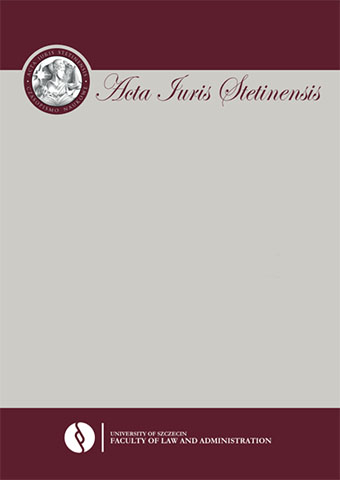







| Authors: |
Dominika
Mróz-Krysta

Katedra Prawa Cywilnego, Wydział Prawa i Administracji, Uniwersytet Jagielloński |
| Keywords: | right of retention analogy expenditures personal property common property |
| Data publikacji całości: | 2019 |
| Page range: | 17 (137-153) |
| Downloads ?: | 1436 |
| 1. | Bieranowski A., Prawa małżonków do mieszkania, w: Małżeńskie prawo majątkowe, Warszawa 2014. |
| 2. | Czachórski W., Brzozowski A., Safjan M., Skowrońska-Bocian E., Zobowiązania. Zarys wykładu, Warszawa 2009. |
| 3. | Doliwa A., w: Kodeks cywilny. Komentarz, red. M. Załucki, Warszawa 2019. |
| 4. | Gawlik Z., Janiak A., Kopaczyńska-Pieczniak K., Kozieł G., Niezbecka E., Sokołowski T., w: Komentarz do art. 710 Kodeksu Cywilnego, red. A. Kidyba, LEX – el., Teza 3. |
| 5. | Jadczak-Żebrowska M., Prawa i obowiązki małżonków, Warszawa 2017. |
| 6. | Janiak A., w: Kodeks cywilny. Komentarz. Tom II. Art. 353–626, red. M. Gutowski, Warszawa 2019. |
| 7. | Kabza E., Problem stosowania analogii w prawie cywilnym, „Forum Prawnicze” 2010, nr 1. |
| 8. | Kocot W., Prawo zatrzymania w prawie cywilnym i handlowym, „Państwo i Prawo” 1994, nr 5. |
| 9. | Koziński M.H., Glosa do wyroku SN z dnia 31 stycznia 2002 r., IV CKN 651/00, „Przegląd Sądowy” 2003, nr 10. |
| 10. | Longchamps de Bérier R., Uzasadnienie projektu kodeksu zobowiązań. Komisja Kodyfikacyjna. |
| 11. | Podkomisja prawa o zobowiązaniach, z. 4, Warszawa 1934. |
| 12. | Michałowska K., Niemajątkowe wartości życia rodzinnego w polskim prawie cywilnym, Warszawa 2017. |
| 13. | Mróz-Krysta D., Obligacyjne skutki ustawowego prawa odstąpienia od umowy, Warszawa 2014. |
| 14. | Olczyk M., Komentarz do art. 28 (1) Kodeksu Rodzinnego i Opiekuńczego, LEX – el., Teza 1. |
| 15. | Nazar M., w: System Prawa Prywatnego. Tom 11. Prawo rodzinne i opiekuńcze, red. T. Smyczyński, Warszawa 2014. |
| 16. | Pietrzykowski K., w: Kodeks rodzinny i opiekuńczy. Komentarz, red. K. Pietrzykowski, Warszawa 2018. |
| 17. | Popiołek W., w: Kodeks cywilny. Tom II. Komentarz. Art. 450–1088. Przepisy wprowadzające, red. K. Pietrzykowski, Warszawa 2018. |
| 18. | Rąpała A., w: Kodeks cywilny. Komentarz. Tom III. Zobowiązania. Część ogólna (art. 353–534), red. M. Habdas, M. Fras, Warszawa 2018. |
| 19. | Rzetecka-Gil A, Komentarz do art. 461 Kodeksu Cywilnego, Lex – el., Teza 49. |
| 20. | Smyczyński T., w: System Prawa Prywatnego. Tom 11. Prawo Rodzinne i Opiekuńcze, red. T. Smyczyński Warszawa 2014. |
| 21. | Wiśniewski T., Glosa do uchwały SN z dnia 29 listopada 1991 r., III CZP 124/91, „Orzecznictwo Sądów Polskich” 1992, z. 9, poz. 207. |
| 22. | Wiśniewski T., w: Kodeks cywilny. Komentarz. Tom III. Zobowiązania. Część ogólna, red. J. Gudowski, Warszawa 2018; |
| 23. | Wiśniewski T., Prawo zatrzymania w Kodeksie Cywilnym, cz. 1, „Przegląd Sądowy” 1999, nr. 2. |
| 24. | Zagrobelny K., w: Kodeks cywilny. Komentarz, red. E. Gniewek, Warszawa 2016. |
| 25. | Zoll F., w: System Prawa Prywatnego. Tom 6., Prawo zobowiązań – część ogólna. Suplement, red. A. Olejniczak, Warszawa 2010. |
| 26. | Postanowienie Sądu Najwyższego – Izba Cywilna z 28 maja 2019 r., II CSK 587/18, Legalis nr 1942530. |
| 27. | Postanowienie Sądu Najwyższego – Izba Cywilna z 31 maja 2019 r., II CSK 618/18, Legalis nr 1950389. |
| 28. | Wyrok SA w Krakowie Wydział I Cywilny z 17 listopada 2016 r., I ACa 789/16, Legalis nr 1564467. |
| 29. | Wyrok SA w Warszawie – VI Wydział Cywilny z 24 marca 2016 r., VI ACa 67/07, Legalis nr 1460551. |